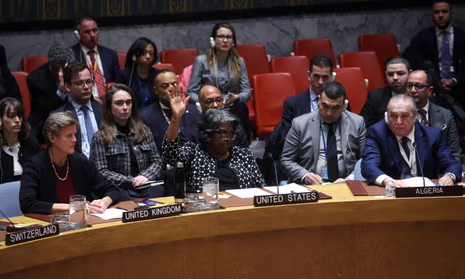On Wednesday, the United States exercised its veto power at the United Nations Security Council to block a resolution that sought to implement a ceasefire in Gaza.
The decision came amidst heightened tensions and an escalating humanitarian crisis in the region. US Ambassador to the United Nations, Robert Wood, explained that Washington’s opposition was rooted in the resolution’s failure to address key issues, including the release of hostages held by Hamas.
The proposed resolution aimed to call for an immediate and unconditional ceasefire in Gaza, which many hoped would alleviate the worsening humanitarian conditions and pave the way for peace negotiations. However, the US government opposed the measure, arguing that it did not adequately consider the broader context of the conflict.

“We made clear throughout negotiations we could not support an unconditional ceasefire that failed to release the hostages,” Ambassador Robert Wood stated, emphasizing that any ceasefire must be tied to the safe return of hostages held by Hamas.
The US stance reflects its longstanding support for Israel, a key ally in the Middle East, and its insistence that any resolution must address both the immediate and underlying causes of the conflict.
READ ALSO: Tottenham Appeals FA Suspension of Rodrigo Bentancur, Calls Sanction “Severe”
The US veto has sparked a range of reactions globally, highlighting the complexities of international diplomacy surrounding the Israeli-Palestinian conflict. For proponents of the resolution, the veto is seen as a missed opportunity to reduce civilian suffering and prevent further loss of life.
Critics of the US decision argue that prioritizing hostage negotiations over a broader ceasefire risks prolonging the violence, exacerbating the humanitarian crisis in Gaza, where thousands of civilians are caught in the crossfire. On the other hand, supporters of the veto contend that any ceasefire without conditions could embolden Hamas, allowing the group to regroup and strengthen its position.

The issue of hostages has been a significant point of contention. Dozens of individuals, including Israeli citizens and foreign nationals, are believed to be held captive by Hamas following the group’s October 7 attacks on Israel. The US and its allies have consistently maintained that their release must be a priority in any diplomatic efforts.
“An unconditional ceasefire would fail to address the plight of the hostages and could inadvertently reward those responsible for acts of terror,” a senior US official said, reinforcing the administration’s rationale.
READ ALSO:
Nigerian Reps Mandates N500bn Recapitalisation for Electricity Distribution Companies
The US veto has drawn mixed reactions from the international community. While some nations, particularly Israel and its closest allies, have backed the US decision, others, including several Security Council members, have expressed disappointment.
Countries advocating for the resolution argue that the humanitarian crisis in Gaza necessitates an immediate halt to hostilities, irrespective of other considerations. They point to the growing number of casualties, the destruction of infrastructure, and the dire conditions faced by civilians as urgent reasons for action.

The US veto underscores the challenges of achieving consensus on the Israeli-Palestinian conflict within the United Nations. It also highlights the complexities of balancing immediate humanitarian needs with long-term security considerations.
As the conflict continues, the international community remains divided on the best path forward. The US has called for a more comprehensive approach that addresses both humanitarian concerns and security issues, while other nations stress the urgency of immediate ceasefire measures.
READ ALSO: China Showcases Next-Generation Weapons and Advanced Drones at Zhuhai Airshow 2024
The US decision to veto the UN Security Council resolution for a ceasefire in Gaza has reignited debates about the priorities and challenges of international diplomacy in conflict zones. While Washington insists that hostage release must be a precondition for any ceasefire, critics argue that the ongoing violence demands urgent action to protect civilian lives.
As the situation in Gaza evolves, the international community faces the daunting task of finding a solution that balances humanitarian needs with the complex realities of regional security and justice.
Discover more from Cine critique
Subscribe to get the latest posts sent to your email.

